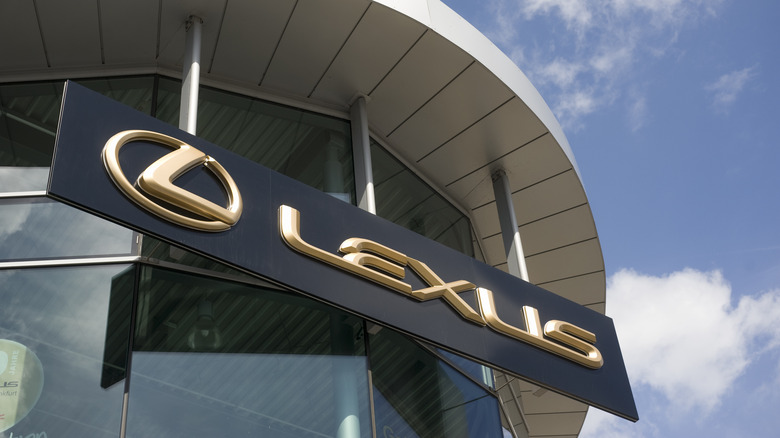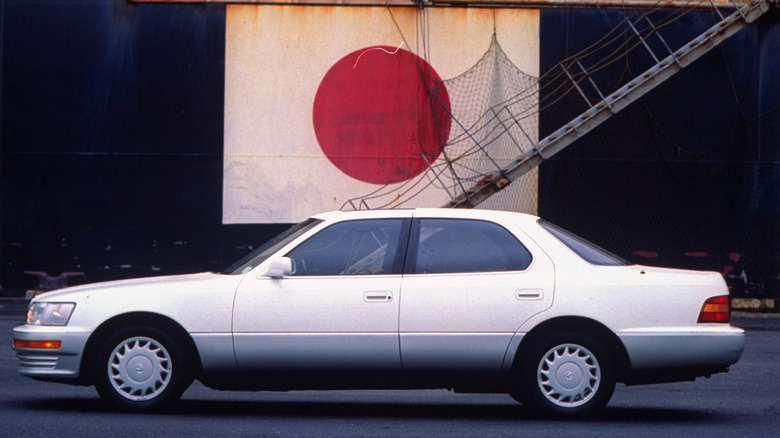A Look At The History Of Lexus: Where Did The Brand Get Its Name & Logo?
It may come as a bit of a surprise to learn that many luxury performance cars you know and love are actually sub-brands of much larger automakers. This practice of creating special sub-brand divisions is pretty common in the industry, with companies seeking to expand their portfolio by offering new, often premium products and services to attract a specific part of the market.
Sub-brands tend to take on a completely distinctive voice and identity, which can be especially critical if the goal is to sell those models internationally. These divisions can also serve as an incubator for specialty projects and exploring innovative ideas, as was the case with the origination of Lexus.
Lexus is actually the luxury vehicle division of the Toyota Motor Corporation. Although the brands present themselves as separate entities with their own distinctive models and designs, Toyota still owns Lexus in the same way that Infiniti is controlled by Nissan or Acura is managed by Honda. The fact that Lexus has only been in existence for 35 years makes its success as fourth among the world's top-ranked luxury brands all the more extraordinary.
The car that plucked the name Lexus out of obscurity
The origin of Lexus can be traced back to the early '80s, when Toyota's then-chairman, Eiji Toyoda, set the agenda for developing a revolutionary sedan that would epitomize luxury. The venture quickly snowballed into creating not only a landmark luxury model, but an all-new brand. From its aerodynamic, conservative aesthetic reminiscent of Mercedes-Benz to its silky smooth V8 engine, the LS 400 was built and rigorously tested in Toyota's manufacturing facilities — and Lexus and Toyota engines are still made in the same factory today.
Designing the LS 400 took nearly the entire decade, and in 1986 Toyota's advertising team hired New York-based consultants Lippincott & Margulies to craft the brand name. The agency provided Toyota with 219 prospective names, all of which it rejected. Among those submissions the executive team actually liked the potential name "Alexis," but it was already used by one of the main characgters in the wildly popular TV series "Dynasty."
Toyota finally settled on the name "Lexus," which combined the Greek "lexicon," meaning language, with the Latin "luxus," which conveys elegance and luxury. It's a little-known fact about Lexus that rumor initially had it the name was an acronym for "Luxury EXport to the United States," but that claim has since been largely discredited. However, the LS 400 did become one of the most widely sold luxury sedans in North America when it hit the market in 1989.
Two different ad agencies worked on the Lexus logo
Unlike Honda's bulky, boxy logo, the Lexus symbol consists of curvy thin lines that form an almost cursive L shape surrounded by an oval. Two different third-party ad agencies were responsible for crafting elements of the Lexus symbol — the eye-catching type face for the name was the work of Saatch & Saatchi DDS while the logo came from Hunter/Korobkin.The L's bent angle and the logo's curvature makes it appear as if the logo is in motion, echoing the brand's focus on setting the bar for consistency, excellence, and cutting-edge performance. This theme of motion was carried over into the name-based logo to form an arrow in the negative space between the E and the X, representing moving forward toward the future.
The logo's oval shape not only serves as a subtle nod at Toyota's own circular identifier but also emphasizes a depth of power and synergy that Lexus has deeply valued since the launch of its very first tagline. Toyota hired California-based Molly Designs, renowned for creating signature brand colors like Kawasaki Green and Yamaha Yellow, to produce the logo with two color combinations: grey with a steel chrome finish, or white and black, both of which highlight the brand's sense of style and finesse. But overall, the Lexus logo has remained relatively unchanged since its first iteration in 1988 because its streamlined appearance has proven so effective as a recognizable symbol of sublime luxury.


